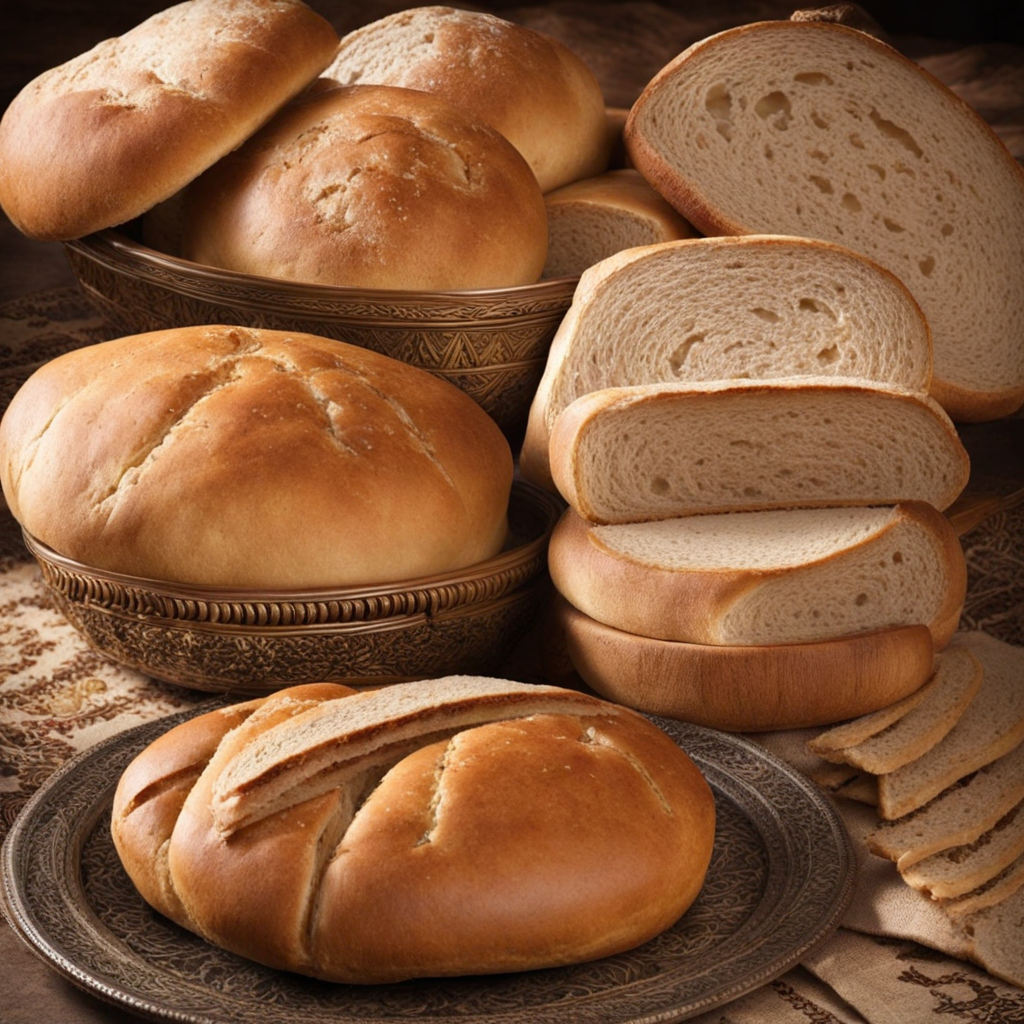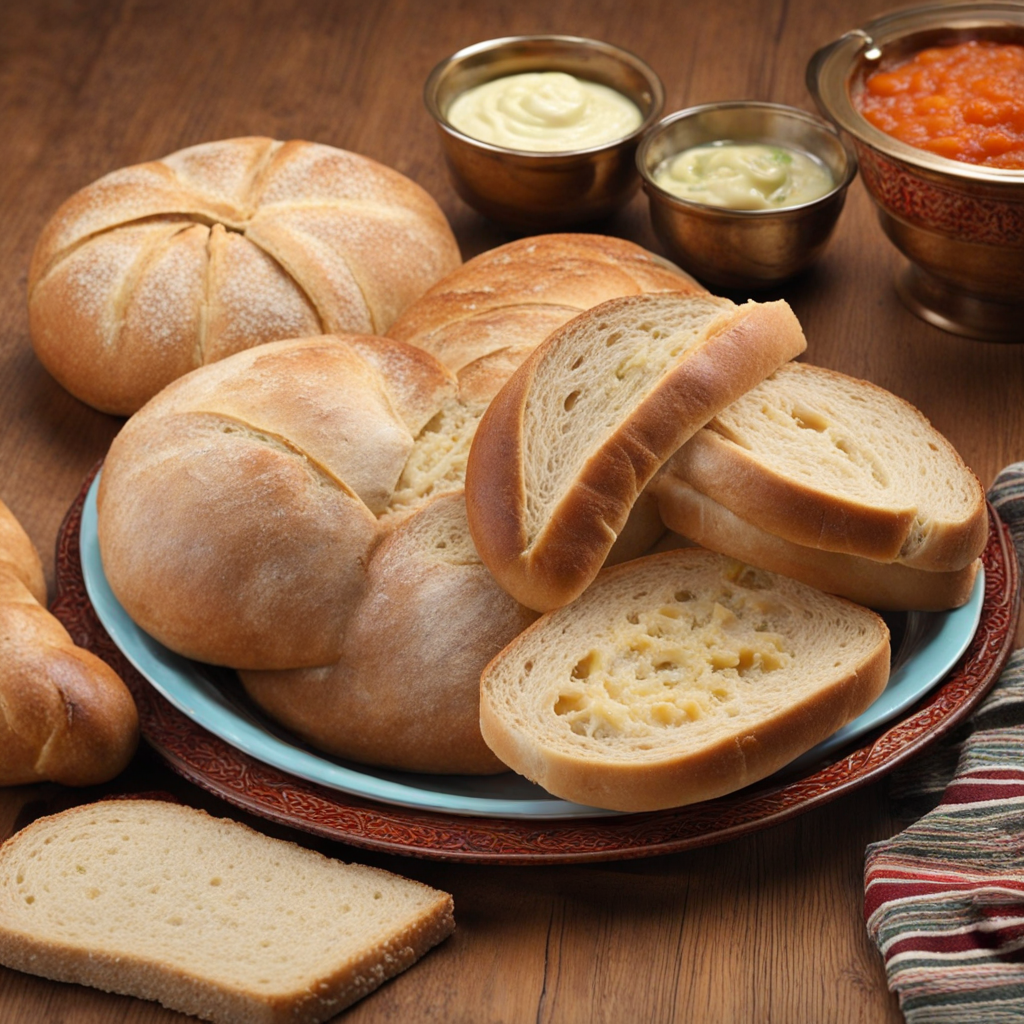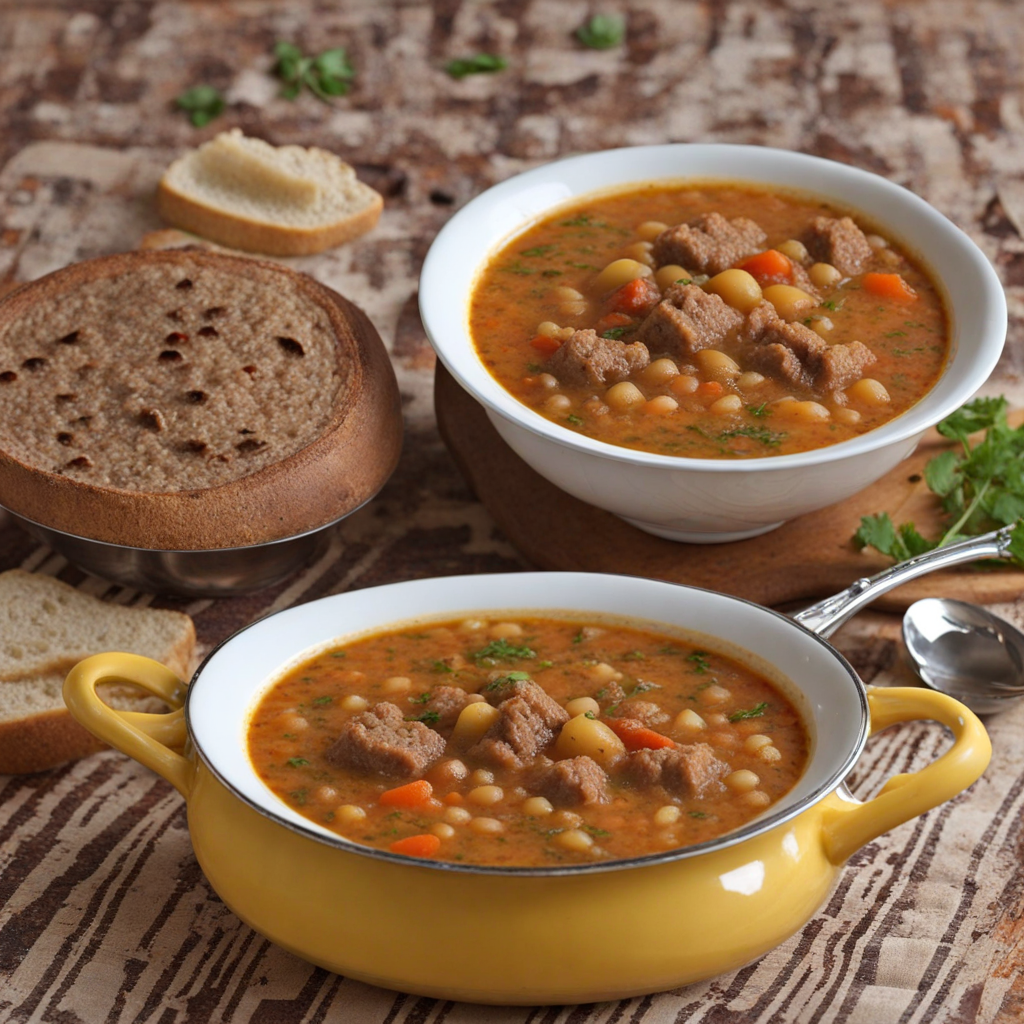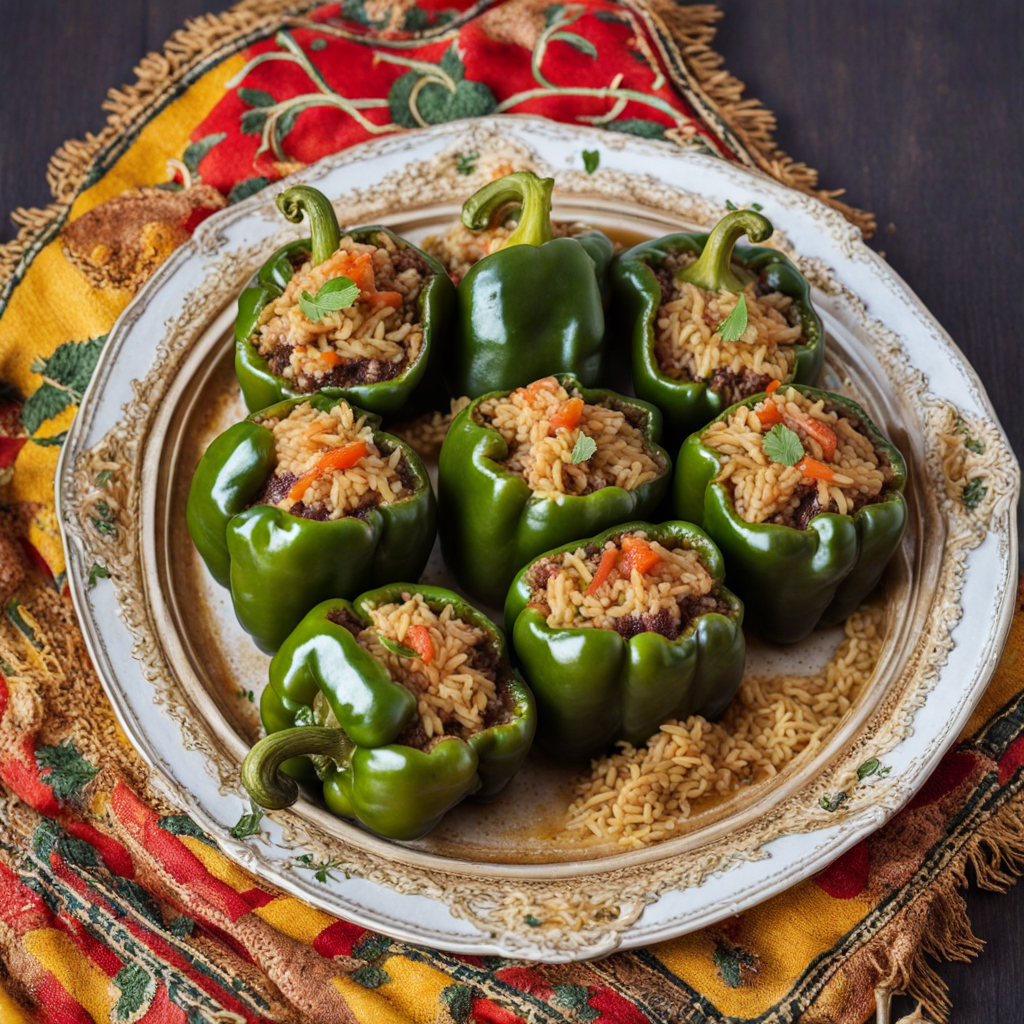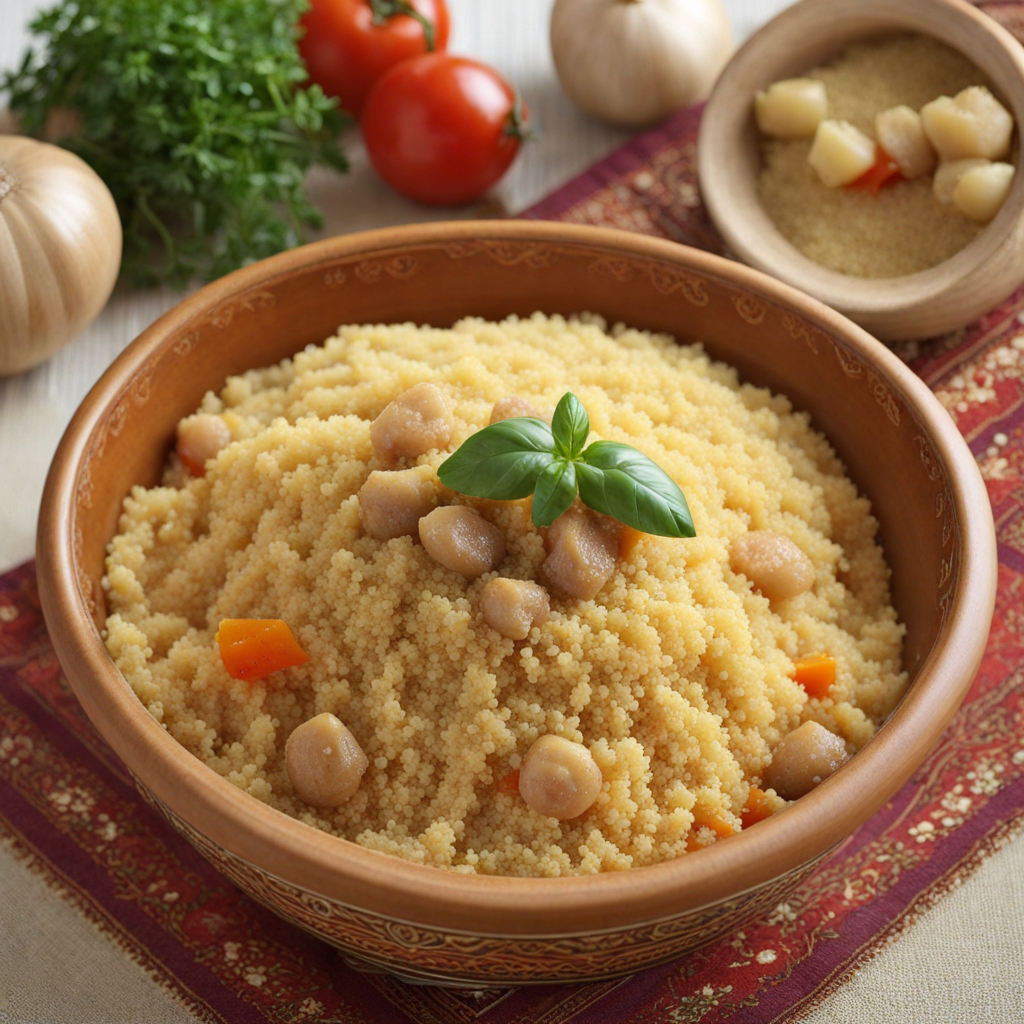Khobz Dar
Khobz Dar, often referred to as "house bread," is a traditional Algerian bread that embodies the essence of home-cooked comfort. This rustic loaf is typically made from a blend of semolina and flour, giving it a unique texture that strikes a perfect balance between soft and hearty. The dough is usually kneaded with warm water and a pinch of salt, then left to rise until it doubles in size, allowing the flavors to develop. The baking process often takes place in a clay oven or on a hot griddle, which imparts a delightful, slightly smoky aroma and a golden crust that entices the senses. One of the defining characteristics of Khobz Dar is its versatility; it can be served with an array of dishes, from rich stews and tagines to simple dips like olive oil and za'atar. The bread's slightly chewy interior serves as an ideal companion for scooping up flavorful bites, making every meal a communal experience. Its rustic appearance, with a slightly uneven surface and a warm, inviting color, invites diners to break bread together, truly embodying the spirit of sharing in Algerian culture. Khobz Dar is not just a staple food; it’s a canvas for creating memorable meals. Many families have their own variations of the recipe, often incorporating spices or herbs that reflect their regional influences. Some may add sesame seeds or incorporate a hint of anise, while others might opt for a more straightforward approach, allowing the natural flavors of the bread to shine through. No matter how it is prepared, Khobz Dar remains an enduring symbol of comfort and tradition, offering a delightful taste of Algeria’s rich culinary heritage.
How It Became This Dish
The History of خبز دار (Khubz Dar) from Algeria #### Origins Khubz Dar, often translated as "house bread," is a traditional Algerian bread that serves as a staple in households across the country. Its origins can be traced back to the Berber people, the indigenous inhabitants of North Africa, who have been cultivating grains such as barley and wheat for thousands of years. The significance of bread in Algerian culture transcends mere sustenance; it embodies a shared history, a sense of community, and a symbol of hospitality. The preparation of Khubz Dar is deeply rooted in the agricultural practices of the region. The fertile soil of the Tell Atlas, where the coastal mountains meet the plains, has long supported the cultivation of wheat. Traditionally, women would grind the grains using a hand mill, creating flour that would then be mixed with water, salt, and sometimes yeast to form a dough. This process was not just a chore; it was a communal activity where women would gather, share stories, and pass down baking techniques through generations. #### Cultural Significance In Algeria, bread is considered a sacred food, integral to everyday life and special occasions alike. Khubz Dar is particularly significant as it is often associated with familial and communal gatherings. The bread is typically baked in a traditional clay oven, known as a "fourn," which enhances its flavor and texture. The act of baking bread becomes an event, where families come together to prepare the dough, share meals, and celebrate their heritage. During important cultural and religious occasions, such as weddings, Eid celebrations, and family gatherings, Khubz Dar takes on added significance. It is customary to serve this bread with various dishes, including tagines, stews, and grilled meats, reinforcing its role as the centerpiece of the Algerian dining experience. In many households, Khubz Dar is not just food; it is a symbol of abundance, hospitality, and the nurturing spirit of Algerian culture. #### Development Over Time As Algeria's history evolved, so did the methods and ingredients used in making Khubz Dar. The introduction of new grains and baking techniques, influenced by various cultures that occupied or traded with Algeria throughout history, has contributed to the bread's development. For instance, the Ottoman Empire, which ruled Algeria from the 16th to the 19th century, introduced new culinary practices that enriched the local cuisine. The influence of the French colonial period also left its mark, as French bread-making techniques were integrated into the preparation of Khubz Dar, leading to variations in texture and flavor. In the 20th century, particularly after Algeria gained independence in 1962, there was a resurgence of interest in traditional foods as a means of reclaiming national identity. During this time, Khubz Dar became a symbol of resistance against colonialism, a reminder of the rich cultural heritage that had been overshadowed by foreign influence. The revival of traditional baking methods, along with the establishment of community bakeries, helped to preserve the art of Khubz Dar making. The globalization of food culture in the 21st century has brought Khubz Dar into a new light. As Algerian expatriates spread across the globe, they have carried their culinary traditions with them, introducing Khubz Dar to international audiences. Additionally, the rise of social media has allowed food enthusiasts to share recipes, techniques, and stories related to Khubz Dar, further popularizing this cherished bread. #### Contemporary Interpretations Today, Khubz Dar continues to evolve while remaining deeply rooted in its traditional origins. Innovative chefs in Algeria are experimenting with different flours, such as semolina or whole grain, and incorporating various spices to create new flavor profiles. There is also a growing trend towards organic and locally sourced ingredients, reflecting a broader movement towards sustainability and health-conscious eating. In urban centers, where traditional practices may have been overshadowed by modernization, Khubz Dar is experiencing a renaissance. Artisan bakeries are reintroducing traditional methods of baking, often blending them with contemporary baking techniques. This fusion not only appeals to a younger generation but also helps to keep the cultural significance of Khubz Dar alive. Moreover, the bread has found its place in the global culinary scene, where it is featured in fusion dishes that combine North African spices with international cuisines. Chefs around the world are recognizing the versatility of Khubz Dar, incorporating it into gourmet offerings and elevating it from a simple staple to a sought-after delicacy. #### Conclusion Khubz Dar is more than just a type of bread; it is a living testament to Algeria’s rich cultural history and the resilience of its people. From its ancient Berber roots to its contemporary interpretations, this bread reflects the evolution of Algerian society, the intermingling of cultures, and the importance of food as a means of connection and expression. As Algerians continue to cherish and celebrate Khubz Dar, they not only honor their culinary heritage but also forge a sense of identity and community that spans generations. This house bread remains a symbol of hospitality, a staple in every household, and a cherished part of Algeria’s food landscape, reminding us of the power of food to connect people to their past while nourishing their present.
You may like
Discover local flavors from Algeria


